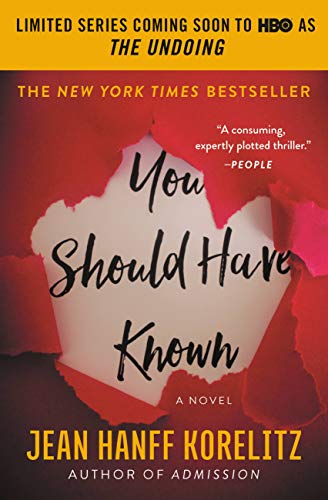Books |
“You Should Have Known” (on HBO as “The Undoing”)
Jean Hanff Korelitz
By
Published: Oct 08, 2020
Category:
Fiction
“The Undoing” is a 4-star HBO production. It stars Nicole Kidman and Hugh Grant. The writer-producer is David E. Kelley, who created “L.A. Law,” “Ally McBeal” and “Chicago Hope.” The director is Susanne Bier, who directed two of my favorite movies, After the Wedding and In a Better World and, more recently, the series of “The Night Manager.” It is, as the press release notes,”based on the novel ‘You Should Have Known,’ by Jean Hanff Korelitz.” Watch the trailer:
Looks interesting. But if it has any trace of the novel in its plot, I missed it. That’s not terrible: a novelist cashes a check and the project… evolves. I’m republishing my 2014 review of the novel because it’s a damn smart book, relevant then and perhaps more now. If you need a break from the news cycle — and who doesn’t? — here’s a plausible weekend escape. Later, when you watch the HBO series, you can muse about the choices Kelley, Bier and Kidman made.
The galleys were a 448-page slab. But the author of “You Should Have Known” is Jean Hanff Korelitz. Her last novel was “Admission,” which became a Tina Fey movie. She’s the founder of the book club service, Book the Writer.[In 2016, I was a guest.] My business partner loved the novel. So I plunged in.
“Usually people cried when they came here for the first time…” We are in the office of Grace Reinhart Sachs, a therapist and, soon, an author with a surefire bestseller. Its title: “You Should Have Known: Why Women Fail to Hear What the Men in Their Lives Are Telling Them.”
There is tough love, and then there is Grace Sachs therapy, which is merciless. “There is no victim,” she tells her patients. Over and over, she says, she hears women describe their early interactions with their partner and their early impressions of him. And as they reminisce, she invariably thinks, “You knew right at the beginning… he’s never going to stop looking at other women… he can’t save money… he’s contemptuous.”
That’s just for openers. As a woman gets into a defective relationship, Grace believes, she kids herself that she’s gotten to know him better — she unlearns what she knows. Which is nuts. Women try on twenty pairs of shoes before they slap down their credit card. But they abandon their critical intelligence when they stumble into the path of an attractive man who’s interested in them. Later, when he proves he’s a jerk, they’re actually surprised. They shouldn’t be — they should have known.
This is, of course, not the therapist’s fate. Oh, no. Grace’s husband is a man she knew she’d marry the night she met him. And he’s turned out to be a saint, a pediatric oncologist at Sloan-Kettering. They have a beautiful home, a fully functioning son. “His life, and her life, was a life of service to terribly unhappy people, carefully balanced by the precious, personal joy of family love and the modest enjoyment of comforts.”
The only glitch in her perfect life? The mothers at her son’s private school, who toss off lines like “Simon said if I finished the half marathon at the beach, he’d take me to Paris.” We have seen these women in many New York novels and Woody Allen movies. They’re usually cliché or worse, caricature. At the first sign of a Birkin bag, I always ask: When did this book turn into satire? The good news: Korelitz makes these women credible — and, in some ways, more human than the therapist with her doomsday theory of women.
A murder? We didn’t see that coming. Or the victim: a woman Grace knows, a mother from her son’s school. Impossible. But there’s another impossibility. We’re on page 100 and although we’ve heard a great deal about Grace’s husband, we haven’t met him yet. He’s at conferences. Obsessive about his patients. Dr. Busy.
How can this be? You know how: Grace’s understanding of her marriage and her man is bullshit. She has quite a lot to learn about her husband, and she’s going to spend the rest of the book learning it — and putting herself through the harsh, painful cure she used to prescribe. Yes, she too should have known. [To buy the book from Amazon, click here. For the Kindle edition, click here.]
There’s a lot of what felt to me like vamping in the middle of the book, because the reader is ahead of Grace. “This would cut like butter,” I thought. Later, I realized the author was tightening the tension. She knew exactly what she was doing. I shouldn’t say more; another breadcrumb would spoil your enjoyment of this extremely enjoyable novel.
How did Jean Hanff Korelitz — a therapist’s daughter — come to write a savvy psychological thriller? It’s this:
“Like many people, I’m fascinated by the fact that we willfully ignore things about the people we think we know best. I’ve seen so many intelligent women standing behind their politician husbands — who have just revealed themselves to be adulterers or addicts or felons — looking absolutely stunned. You ask yourself: ‘How could she not have known?’ I wondered how much more interesting it would be if the woman in question was supposedly an expert on human behavior, and highly capable of sensing subterfuge in her patients’ spouses.”
How very much more interesting indeed.


